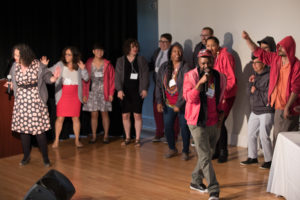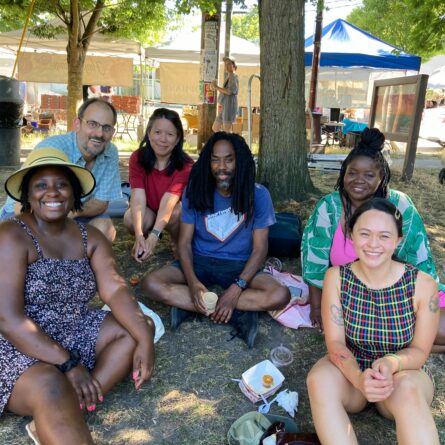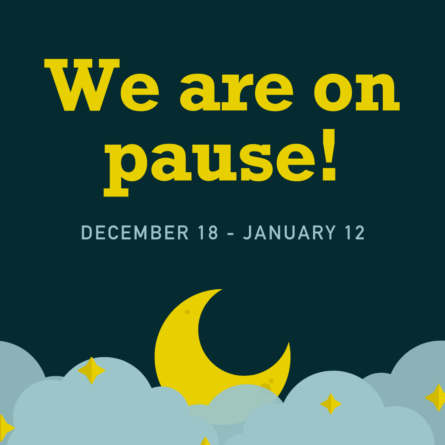
News + Events

On June 3, over 300 people gathered at Washington Hall in Seattle for Social Justice Fund NW’s 40th Anniversary Celebration. It was a historic occasion, marking four decades of grantmaking to grassroots community organizations in Washington, Oregon, Idaho, Montana, and Wyoming.
In 1978, SJF was founded by a group of progressive donors and originally named A Territory Resource. Two of the original founders – Maxwell Milton and Jill Bullitt – were in attendance at the celebration and received a special acknowledgement, along with early supporter Andrea Rabinowitz. Three grantee organizations who have received grants since the 1980s – Pineros y Campesinos Unidos del Noroeste (PCUN), Native Action, and Western States Center – were also recognized.
As part of the event, a special installation displayed SJF’s 40-year history, including an artistic representation – using colored pieces of yarn – of every grant made by decade, totalling over 2,100. A decade-by-decade history timeline charted the various foundation milestones, movement moments, and grantee victories SJF has been involved in since 1978, while quotes and portraits of dozens of past and present SJF staff, board members, donors and grantee leaders decorated the exterior of the exhibit.
View Photo Gallery and Video
SJF Executive Director Mijo Lee made a powerful speech about ATR/SJF’s history, about community organizing, and about hope. Here’s an excerpt:
A lot has changed over the last 40 years. Growing wealth inequality and especially a growing racial wealth gap. The proliferation of the nonprofit industry and institutional philanthropy in particular. The rise of the extreme right wing, white supremacist and white nationalist movements – beat back by ATR grantees in the ‘90s – returning like a horror movie villain wearing khakis and a polo shirt today. In the last 40 years, new frameworks of race and gender have transformed the way we envision social justice. The internet has fundamentally changed the way we organize. What has stayed the same? That we need to organize.
Our definition of organizing has evolved over the years, and continues to. But organizing means, fundamentally, that you’re never on your own, that our collective power is stronger than the sum of its parts. So Rosa Parks wasn’t just a tired seamstress who’d suddenly had enough, as so many of us were taught in elementary school. She was an organizer who had trained and strategized for that moment, and who took an incredible risk knowing that she was part of a movement, knowing that she was not alone.
… One of the hard things about organizing is that it can be a long time before we see the fruits of our labors. It takes a lot longer than a grant cycle, it can take years or even generations. When we invest in organizing – with our time, energy, and money – we know we’re investing in change. But we don’t know when we’ll achieve the changes we seek. It’s like heading up a curvy road, unable to see around the bend, having faith that the road will take us where we need to go. It can be tempting to consider a more straightforward route to a less ambitious destination. But in the Northwest, we’ve all driven through mountains. The only way to the top is on a curvy road, with all the uncertainty that entails.
SJF stands on 40 years of history. We have the benefit of looking back on 40 years and seeing what happens you head up that road. I can see that when Oregon grantees like Rural Organizing Project and PCUN banded together in the ‘90s to defeat the viciously homophobic Measure 9, they forged personal and organizational relationships that make each of their organizations stronger to this day. The word intersectionality wasn’t really being used then, but they understood that their communities – LGBTQ, immigrant, Latinx, indigenous, workers – were not separate. And neither were their struggles. I see them putting those lessons into practice every day. I can trace a direct line from longtime grantee LELO (rest in power Tyree Scott) to the environmental justice powerhouse of Got Green. And as Got Green founder Michael Woo says in one of the stories in our history installation, “When you pass one of Sound Transit’s construction sites today and see people of color and women working there, it’s because of LELO’s Family Wage Jobs organizing.”
But in 1978, they couldn’t know any of that.
On June 2 we had a reunion with folks from the early years and someone brought a copy of the very first grantmaking report. It talked about their first couple years of grants and explained why they had chosen to focus their funding on community organizing. I was struck by one sentence in particular: “Community organizing is still too new to judge.”
Here’s what I found striking about that statement.
First, I’m reminded that the definition of organizing is always in development. The concept of communities coming together to build collective power – that’s not new now, nor was it then. We all understand that’s been happening since time immemorial. But what the ATR founders were talking about was a particular strategy, a particular definition of community organizing and the even newer strategy of funding it. At the time there was a movement, a burgeoning of social justice philanthropy, and they were all figuring it out as they went.
Second, they did not claim to have all the answers. In contrast to many of the people I encounter in philanthropy today, they were really clear about what they didn’t know. They said, we can’t know for sure what this will yield. We have no pie charts to back it up. But we know the theory is solid. We know for a fact that people are stronger together, that we always need leaders, that the people most impacted by injustice have expertise that has been ignored for too long, and that the injustices we face are too dire to wait around for a certainty that will never come. This shows me that from day one this organization has been characterized by the strategic and necessary practice of hope.

